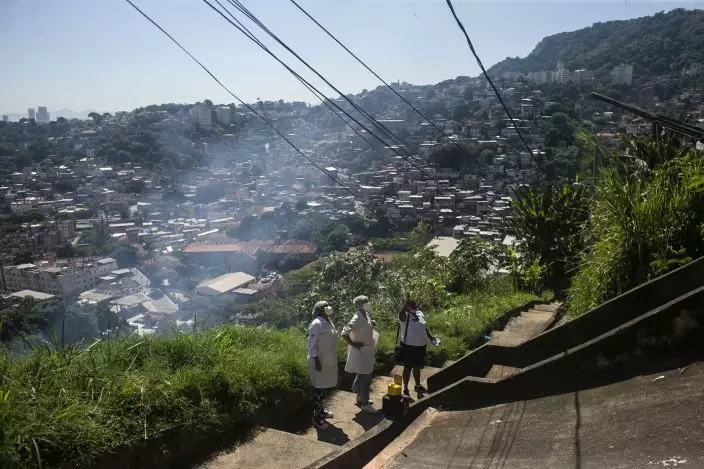Rio de Janeiro halted new vaccinations against COVID-19 for a week starting Wednesday due to a shortage of doses, one of a growing number of Brazilian cities that have run low on supplies and are demanding help from Brazil's federal government.
City officials said they will continue to deliver second doses to those who have already been injected once, but have paused new shots for the elderly.
Officials say vaccines for new recipients ran out partly because they had pushed forward their schedule by one week after receiving a fresh lot of doses. Rio Mayor Eduardo Paes said on Monday that additional shots won't be delivered before next week.

Healthcare workers wait along a footpath of the Mineira slum as they wait to be received by an elderly person during an expansion of the city's vaccination program for seniors who cannot leave their homes, in Rio de Janeiro, Brazil, Tuesday, Feb. 16, 2021. (AP PhotoBruna Prado)
“We are ready and we have already vaccinated 244,852 people,” he said on his official Twitter profile. “We just need the vaccine to arrive.”
Other state capitals have had to adopt similar strategies, such as Salvador, in the northeastern state of Bahia, and Cuiaba, in Mato Grosso state. Looming shortages have also been reported in at least four other capitals, according to Brazilian newspaper O Globo.
Some mayors and governors have blamed the administration of Brazilian President Jair Bolsonaro for the delays. For months, Bolsonaro cast doubt on the effectiveness of the CoronaVac vaccine made by Chinese firm Sinovac and bet the country’s entire immunization campaign on a single contract for 100 million doses of the AstraZeneca product.
But only 2 million of those have arrived, and the federal government has since been relying on CoronaVac doses it purchased from Sao Paulo state’s Butantan Institute in January, more than a month after Butantan began receiving the first doses.
Butantan and the Health Ministry this week signed a second contract for 54 million doses in addition to a contract for 46 million doses signed on Jan. 7.
“This contract, like the first, was a struggle. It was only signed yesterday, with countless comings and goings, countless changes in the clauses,” said Dimas Covas, director of the Butantan Institute.


